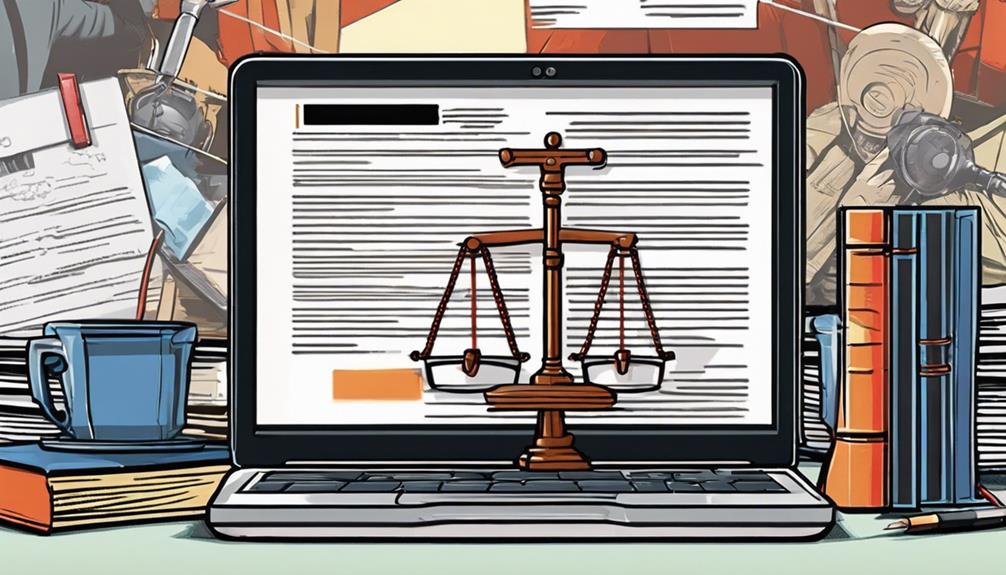The Legal Lowdown: Essential Legal Considerations for Bloggers
Exploring the legal landscape as a blogger can be a minefield, with potential pitfalls lurking at every turn. From copyright laws to FTC disclosure rules, the legal considerations for bloggers are vast and complex.
Understanding these vital aspects is not just important but can also be the difference between success and legal trouble in the digital world.
Make sure you stay informed and compliant to protect yourself and your blog from unnecessary risks.
Copyright Laws
To guarantee you're compliant with copyright laws as a blogger, it's essential to comprehend the regulations surrounding the use of others' intellectual property. Copyright laws are in place to protect the original works of creators, such as written content, images, videos, and music, from being used without permission. As a blogger, it's vital to respect these rights and make sure you have the appropriate permissions or licenses before using any content that you didn't create yourself.
When using images or graphics in your blog posts, make sure you have the right to use them. This could involve obtaining permission from the creator, purchasing a license, or using content that's labeled for reuse. It's important to note that simply giving credit to the original creator isn't always sufficient to avoid copyright infringement.
Fair Use Guidelines
Understanding the guidelines for fair use is important for bloggers to navigate copyright laws effectively and ethically. Fair use allows for the limited use of copyrighted material without permission from the rights holder for purposes such as commentary, criticism, news reporting, teaching, scholarship, or research.
To determine if your use of copyrighted material falls under fair use, consider factors like the purpose of the use, the nature of the copyrighted work, the amount used, and the effect on the market value of the original work.
When incorporating copyrighted material into your blog posts, it's essential to provide proper attribution to the original creator and not use more than what's necessary for your intended purpose. Remember that fair use isn't a blanket permission; it's a nuanced concept that requires careful consideration.
Privacy Policies
Consider the importance of privacy policies for bloggers to guarantee compliance with legal regulations and protection of user data. Privacy policies are vital for informing your audience about how their information is collected, used, and protected on your blog. By having a clear and thorough privacy policy, you not only demonstrate transparency but also build trust with your readers.
Make sure your privacy policy includes details on the type of data collected, how it's stored, who's access to it, and how users can opt-out or request deletion of their information. It's essential to review and update your privacy policy regularly to reflect any changes in your data practices or applicable laws.
Defamation Risks
Make sure you're aware of the defamation risks associated with your blog content to safeguard yourself legally and reputation-wise. Defamation occurs when a false statement is made that harms a person's reputation. As a blogger, it's important to understand the potential risks involved to protect yourself and your blog's credibility.
Here are four key points to keep in mind regarding defamation risks:
- Truth: Make certain that all statements made on your blog are truthful and supported by facts. Avoid spreading false information that could harm someone's reputation.
- Opinions: Differentiate between statements of fact and opinions. While facts can be proven true or false, opinions are generally protected under free speech laws.
- Public Figures: Be cautious when discussing public figures. They've a higher threshold to prove defamation due to their position in the public eye.
- Legal Consequences: Understand the legal consequences of defamation. Depending on the severity, you could face lawsuits, damages, and harm to your reputation. Be mindful of what you publish to maintain your credibility and legal standing in the blogging world.
FTC Disclosure Rules
Bloggers must adhere to FTC disclosure rules to guarantee transparency with their audience regarding sponsored content and potential conflicts of interest. When creating content that has been sponsored, endorsed, or paid for in any form, it's essential to disclose this relationship.
The FTC requires clear and conspicuous disclosure, meaning it should be easily noticeable and understandable to your readers. Disclosures must be made before any affiliate links or sponsored content, ensuring that your audience is informed from the start. Remember, these rules also apply to social media posts, not just blog content.
Failure to comply with FTC guidelines can result in serious consequences, including fines. To stay on the right side of the law, always disclose any connections to products or brands you promote. Maintaining honesty and transparency with your audience builds trust and credibility, essential elements for a successful blogging career.
Trademark Protections
Trademark protections are important for safeguarding your brand identity and preventing unauthorized use of your intellectual property. As a blogger, understanding how trademarks work can help you protect your blog name, logo, or any unique branding elements.
Here are four key points to take into account:
- Register Your Trademark: Registering your trademark with the appropriate government agency provides you with exclusive rights to use that mark in connection with your blog. It also gives you legal recourse against anyone who tries to use it without permission.
- Monitor and Enforce Your Trademark: Regularly monitor the use of your trademark to make sure others aren't using it without authorization. If you find any unauthorized use, take prompt legal action to enforce your rights.
- Use Trademark Notices: Use symbols like ™ for unregistered trademarks and ® for registered trademarks to put others on notice of your rights. This can deter potential infringers.
- Consult with a Legal Professional: When in doubt about trademark issues, seek guidance from a legal professional specializing in intellectual property to ensure your rights are protected effectively.
Contractual Agreements
Understanding the importance of contractual agreements is essential for bloggers to protect their interests and clarify expectations when collaborating with others. When engaging in partnerships, sponsored content, or any form of collaboration, having a well-drafted contract is vital. Contracts outline the responsibilities of each party, payment terms, ownership rights, and dispute resolution mechanisms. As a blogger, you should make sure that all agreements are in writing to avoid misunderstandings or disagreements down the line.
When entering into contractual agreements, pay close attention to the terms and conditions specified. Make sure that the contract clearly defines the scope of work, deadlines, compensation details, and any exclusivity clauses. It's advisable to seek legal advice, especially for complex agreements or those involving significant financial implications.
Data Protection Regulations
Ensuring compliance with data protection regulations is paramount for safeguarding sensitive information and maintaining trust with your audience as a blogger. Here are four key considerations to keep in mind:
- Transparency: Clearly communicate to your audience how their data will be collected, stored, and used on your blog. Transparency builds trust and shows respect for their privacy.
- Consent: Obtain explicit consent before collecting any personal data from your audience. This guarantees that individuals are aware of and agree to how their information will be processed.
- Security Measures: Implement robust security measures to protect the data you collect. Encryption, secure servers, and regular data backups are essential to prevent unauthorized access or data breaches.
- Data Retention Policies: Establish clear guidelines on how long you'll retain personal data. Only keep data for as long as necessary and securely dispose of it when no longer needed to minimize risks associated with data storage.
Content Licensing
When considering content licensing for your blog, it's essential to understand the implications and rights associated with sharing or using third-party content. Content licensing refers to the process of granting permission to others to use your content based on specific terms and conditions. As a blogger, you have the freedom to decide how your content can be shared, reused, or modified by others.
When you create original content for your blog, you automatically own the copyright to that material. However, if you wish to allow others to use your content, you can license it under certain conditions. These conditions can include specifying how your content can be used, whether it can be modified, and if attribution is required. By clearly outlining these terms through a licensing agreement, you protect your rights while also granting permission for others to utilize your work.
Understanding content licensing empowers you to control the distribution and usage of your blog content, ensuring that your creations are respected while also fostering collaboration and sharing within the blogging community.
Domain Name Issues
Consider carefully selecting a distinctive domain name that aligns with your blog's branding and purpose to avoid potential legal conflicts. Your domain name isn't just your web address; it's also your online identity. Here are some essential points to keep in mind regarding domain name issues:
- Originality is Crucial: Guarantee your domain name is unique and not already trademarked by another entity to prevent infringement claims.
- Steer Clear of Trademarked Terms: Avoid using trademarked terms in your domain name to evade legal disputes with trademark owners.
- Privacy Protection: Consider opting for domain privacy protection services to shield your personal information from being publicly accessible in WHOIS databases.
- Stay Vigilant about Renewals: Stay alert about renewing your domain name to prevent accidental expiration, which could lead to someone else acquiring it.
Dispute Resolution Options
To address any potential conflicts related to domain name issues on your blog, understanding the available dispute resolution options is key in safeguarding your online presence and brand integrity.
When faced with a dispute over your domain name, you have several options for resolution. One common avenue is arbitration through organizations like the World Intellectual Property Organization (WIPO) or the National Arbitration Forum (NAF). These forums provide a streamlined process for resolving domain name disputes outside of traditional court litigation.
Another option is mediation, where a neutral third party assists in facilitating a resolution between you and the opposing party. Additionally, negotiation directly with the other party involved can sometimes lead to a mutually beneficial agreement.
It's essential to carefully review the terms of service of your domain registrar, as they may outline specific procedures for resolving disputes.
Frequently Asked Questions
Can a Blogger Be Held Liable for the Comments Left by Users on Their Blog?
Yes, as a blogger, you can be held liable for the comments left by users on your blog. It's important to moderate and monitor user-generated content to guarantee it complies with legal standards.
Are Bloggers Required to Disclose When They Have Been Paid to Promote a Product or Service?
You must disclose when you're paid to promote a product or service. Transparency builds trust with your audience and helps you comply with legal guidelines. Failure to disclose could lead to legal repercussions and harm your reputation.
How Can Bloggers Protect Themselves From Copyright Infringement Claims for Using Images Found on the Internet?
To shield yourself from copyright infringement, always use images with proper licensing, seek permission, or create your own visuals. Free stock photo websites offer a wide array of images for your blog posts. Be cautious and responsible.
What Are the Legal Implications of Using Affiliate Links in Blog Posts?
When using affiliate links in blog posts, remember to disclose them clearly to your readers. Assure compliance with FTC guidelines by disclosing relationships and potential benefits. Stay transparent and honest to maintain trust with your audience.
Can Bloggers Be Held Responsible for the Accuracy of Information Shared on Their Blog?
You, as a blogger, can be held responsible for the accuracy of information on your blog. Being diligent in fact-checking, citing sources, and providing accurate information can protect you from potential legal issues and maintain credibility.
Conclusion
To sum up, maneuvering the legal landscape as a blogger can be like walking through a minefield – one wrong step could lead to serious consequences. By understanding and adhering to copyright laws, privacy policies, and disclosure rules, you can build a sturdy legal foundation for your blog.
Remember, the legal lowdown is your compass in this vast wilderness of regulations and guidelines. Stay informed, stay compliant, and watch your blog flourish under the protection of the law.







